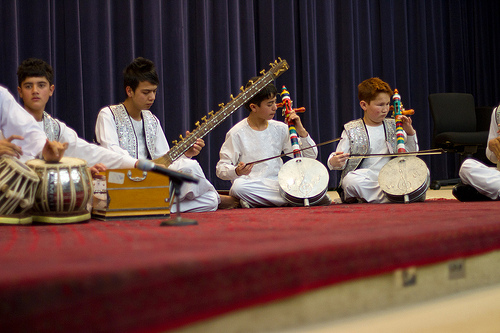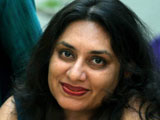Music for the Muslim Soul
by Bina Shah / February 19, 2013 / No comments
Musical programs in Pakistan and Afghanistan push for harmony, despite pressure from fundamentalists

The Afghanistan National Institute of Music Youth Orchestra performs for the U.S. Department of State in February 2013. Photo: U.S. Dept. of State on Flickr.
From time to time I come across certain Muslims who like to argue that music is “haram,” or disallowed by Islamic law. Usually fundamentalists, they follow the hardline Salafi reasoning that music distracts you from your prayers and leads you towards more forbidden behavior, such as dancing in nightclubs with members of the opposite sex. They point to examples in Islamic history of how the Prophet Muhammed, peace be upon him, only listened to the sound of drums (duff) and human voices. And from these points, strung together like beads on an erratic, broken necklace, they draw the conclusion that music is forbidden in Islam.

- Pakistan is a country of contradictions – full of promise for growth, modernity and progress, yet shrouded by political, social and cultural issues that undermine its quest for identity and integrity. My bi-monthly column “Pakistan Unveiled” presents stories that showcase the Pakistani struggle for freedom of expression, an end to censorship, and a more open and balanced society.

- Bina Shah is a Karachi-based journalist and fiction writer and has taught writing at the university level. She is the author of four novels and two collections of short stories. She is a columnist for two major English-language newspapers in Pakistan, The Dawn and The Express Tribune, and she has contributed to international newspapers including The Independent, The Guardian, and The International Herald Tribune. She is an alumnus of the International Writers Workshop (IWP 2011).
Pakistan has seen its share of depressing, violent actions against music and musicians. When the Taliban ruled the Swat District, a valley close to the border, they banned music, taking a cue from similar actions in Afghanistan. Threatened with punishment, or even death, traditional Pakistani musicians had to pack up their instruments and leave their towns and villages. Shabana, a Swat dancing girl, was executed in 2009 after she performed at a wedding ceremony in Mardan. For a time, things looked bleak for the music scene in Swat, and this culture of silence could have easily spread all across Pakistan. Indeed, even though the Taliban were driven out of Swat by armed forces in 2009, the pressure on music and musicians remains, with militants declaring bans on CD stores from time to time and singers and dancers never knowing when religious vigilantes might target them.
However, those who oppose music in the name of Islam are making the grave mistake of ignoring the long and rich history of Islamic science and medicine’s use of music as a therapeutic tool. As LA-based author Kamran Pasha wrote a few months ago on his Facebook page, “Whenever you hear a foolish Muslim tell you that music is haraam (forbidden), you should let them know that historically Muslims were the leaders in music therapy and considered music as a divinely blessed means of using sound and vibration to promote health and psychological balance.”
Like Pakistan, a place that needs a great deal of psychological healing after its decades of war is Afghanistan—and the country’s National Institute of Music (ANIM) is doing just that through the expansion of music programs. Over the last three years in Kabul my friend William Harvey, a Juilliard-trained violinist, has been teaching violin and viola to Afghani children, many of whom are orphans or street children who make a living selling chewing gum. Harvey has also just pulled off a major coup: He’s taken sixty members of the ANIM Youth Orchestra on a tour to the United States. They recently played a sold-out performance at the Kennedy Center in Washington DC, and followed it with a trip to New York City where they played at Carnegie Hall. The students are unabashedly honest about how music has changed their lives, saved them from the continued trauma of life on the streets, and made them believe in themselves again.
In Pakistan, there’s a similar recognition that music can do much to unite and heal fractured souls. One of Pakistan’s most popular pop groups, Vital Signs, is reforming twenty-five years after their original stint to release a new track called “Naya Pakistan” (New Pakistan). The reunited group includes Junaid Jamshed, the former heartthrob of the band who eventually became a born-again Muslim, grew a long beard, and abandoned the music industry in favor of singing religious devotionals. He has now given up singing altogether, but has consented to come back to the group and record a few spoken lines for the sake of the band and its mission to usher in positive change to our troubled country.
The debate about music’s place in the life of Muslims will probably go on forever. But helping a fellow human being is one of the foremost tenets of Islam, and despite the misgivings of fundamentalists in our society, it’s obvious that many Muslims believe music can be used for positive effect instead of harm. This idea is vital to countries like Pakistan and Afghanistan that have experienced decades of discord and are now searching for harmony in the years ahead.




